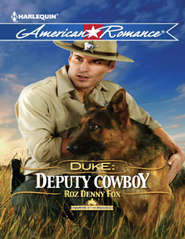По всем вопросам обращайтесь на: info@litportal.ru
(©) 2003-2024.
✖
A Secret To Tell You
Автор
Год написания книги
2018
Настройки чтения
Размер шрифта
Высота строк
Поля
Norma lowered her voice. “Maybe you should listen to Hayley’s suggestion. You were rude to Ms. Trent. A simple apology might achieve our goal.”
“If I knew the goal,” he muttered, and left her with a look that said plainly it was against his inclinations to go after April Trent.
On the way to his house out back, Quinn spent more time mulling over what excuse he’d give Hoerner for skipping out on his generous cocktail party. After changing clothes, Quinn called the kindly state representative and explained that his grandmother urgently required his help.
Not until Quinn drove out the gate did he realize it stood wide open. Only then did he feel less hostile toward the woman who’d disrupted his evening. Yesterday, Joseph Langford, Gram’s driver, had reported to Quinn that he’d had trouble closing the electronic gate. So April Trent hadn’t scaled the fence as Quinn had all but accused her of doing. She’d strolled right through.
Now he’d probably have to apologize. And tomorrow get onto the perimeter-fence firm to fix the system. The company should have phoned him when they detected a breach. Quinn paid dearly for a firm to monitor the gate’s daily operation—one more nuisance to add to a growing list, at a time when election meet-and-greets, donor balls, et cetera, were exploding into high gear.
And now this…this letter debacle of his grandmother’s. The Trent person had referred to them as love letters. What kind of nonsense was that? Although his grandmother hadn’t rushed to deny that claim, or anything else April Trent had said.
Quinn’s head pounded as he considered even the hint of a skeleton popping out of his family closet this close to the end of a bitter campaign. His opponent was the king of muckrakers.
Or was he dodging shadows where none existed? After all, they were talking about Grandmother Santini. As far back as Quinn could remember, she’d epitomized grace and dignity. As well, she’d been happily married to the grandfather he’d never met for—what—more than two decades? He’d heard his dad brag that Anthony had rubbed elbows with Presidents Roosevelt, Truman and Eisenhower. Quinn was probably worrying about nothing. Besides, trying to throw dirt on an eighty-two-year-old woman was bound to backfire.
God, those letters must be ancient. Quinn’s grandfather had died before Quinn was even born. 1968, he thought. Gram had always lived alone in the big house, but her only son had lived close by. Quinn grew up running in and out of both places. Until he went off to college. Right out of law school, he’d married Amy, and they’d moved to Richmond, where he took a job as a state prosecuting attorney. He’d been twenty-four. No, twenty-five. Lordy, where had those ten years gone? He was thirty-five now, and tonight he felt every minute of it.
Jeez, it was dark in this neck of the woods. The lack of street lights didn’t help; neither did the squall that had sprung up.
Straining to see through the hypnotic swish of wiper blades, Quinn suddenly slammed his foot on the brake and felt the rear of the car fishtail before he managed to stop—there was a doe elk standing in the center of the road. Seconds later, a big bull elk bounded out of the darkness. The two magnificent animals cantered across the asphalt and melted into a thicket of underbrush to Quinn’s left. Rain hammered on the sunroof of the Lexus, reminding him to get underway. He turned on the radio to a favorite classical station before starting off at a much slower pace. Who knew what kind of wildlife might live out here?
Even though he drove slowly, he passed Oak Grove Road and was forced to make a U-turn. Quinn wondered what had possessed a young woman to buy a home so remote from any neighbors. How old was April Trent, anyway? Her brother Miles, was roughly Quinn’s age. Roger had to be a few years Miles’s junior, as he’d only recently finished an orthopedic residency in Bethesda. Quinn had also heard that Roger had just bought a practice, located near the Trents’ law firm, from a newly retired surgeon. Which didn’t tell Quinn a thing about April’s age. He considered himself a reasonable judge of age, since he’d spent several years representing men and women from their teens to their midnineties in court. One learned to gauge people quickly and accurately.
Quinn would be willing to bet April Trent was staring down the barrel of thirty. He couldn’t imagine why he’d even noticed, but she hadn’t worn a wedding ring. Of course, that didn’t mean she wasn’t living out here in the sticks with a significant other. He decided she probably was. Otherwise, he would’ve run across her in the parade of twenty-to-thirtyish singles who stalked the favorite cocktail bars of the area’s upwardly mobile.
He grimaced, recalling how many of the town’s unattached women had gone out of their way to meet him. It had become embarrassing, if not annoying. When he griped to friends, they pointed out that was a normal part of being in the public eye. Married pals were quick to add that if Quinn would pick one of the many available women and settle down, it’d be broadcast far and wide and he’d be out of the market. He would—if he ever found someone who shared his commitment to the environment and to family—someone who wasn’t just interested in his money and so-called good looks.
The road narrowed and branches draped low over what had become a series of potholes. There! Lights straight ahead. Hadn’t Gram said the farmhouse sat at the road’s end?
He could only picture how muddy his car must be as he eased down a drive that resembled one giant mud puddle. Quinn sat surveying the house for a moment after he shut off the car’s motor. The building was long, low-slung, with a new shake roof, but with walls solidly built of red brick. Quinn saw the potential in the whole package. People paid well for privacy, and this place certainly offered that.
He opened the door and climbed out slowly. He vaguely wondered if April Trent had a dog she’d trained to take an intruder’s leg off.
Except for the patter of rain and the sizzle when raindrops struck the hot hood of his car, he was engulfed in silence. Quinn liked solitude. So did his grandmother. He was beginning to see why she’d hated to leave this farmhouse.
April, who’d taken a break from sanding original cove molding she wanted to reuse for its authenticity, heard a car enter her drive. Was it Eric coming back again—to see if he could wheedle the letters out of her?
She jammed the cork into the bottle of white wine from which she’d just poured herself a glass. She glanced at the rows of crystal stemware hanging upside down under a cupboard wine rack she’d added in her full kitchen remodel. If she poured Eric a glass of wine, it might encourage him to think he held a special place in her life, which wasn’t true. She opened her fridge and set the bottle and her full glass on a shelf.
She closed the fridge and waited for the chime of her doorbell. Nothing. An icy feeling slithered up her spine. Reaching for her portable phone, she turned off the kitchen lights, then slipped between the thick plastic sheeting and around the corner.
It was odd, but until she’d found those letters, and Eric and then the Santinis had gotten so snippy with her, April had never experienced a moment of unease about living in unfinished homes in desolate places. Now she wished she had curtains on the two huge picture windows that flanked her front door. Only one dim outdoor light shed any glimmer through the darkness.
Dropping to her knees, she crawled under the window and crept to the door. The sudden shrill ringing of the doorbell made her yelp and fall backward. “Who’s there?” she called shakily, not liking the fright she could hear in her own voice.
“It’s Quinn Santini.”
Bolting upright, April peaked around the window frame, and sure enough, there he stood on her porch, broad shoulders hunched forward to ward off the slanting rain.
“What do you want?” A fast examination of the man on her porch told April he no longer wore his made-to-order tuxedo. But, damn, in the feeble, diffused light shining from the single porch bulb, Santini looked even more gorgeous in faded blue jeans and well-worn sweatshirt than he had in that tux. His sun-streaked blond hair, appealingly tousled, curled around his ears from the rain.
In the silence, he announced loudly, “My grandmother wants the letters you found.”
“Is she with you?”
“No. Listen, let me in so we can talk terms. I know I said I wouldn’t pay…but I brought my checkbook.”
April sucked in a narrow stream of air. “Please go. You’re wasting your time and mine.”
“I didn’t drive all the way to hell and gone just to leave again without those damned letters, Ms. Trent.”
“Well, you’re not getting them,” she shouted.
“I want them.” Clearly frustrated, he slapped a flat palm against the door.
“I’m holding my phone, Mr. Santini. If you don’t leave this instant, I’m going to call the police and tell them you’re harassing me.” She didn’t add “turn about is fair play,” but she wanted to throw his own threat back in his face.
“Don’t do that!” Quinn paced over to the window and cupped his hands around his eyes, attempting to see inside.
When she saw what he was doing, April stepped right in front of his face, misshapen by the rain on glass. She snapped on an interior light and shook the phone in a menacing manner, making sure he got her message. Then she punched out the 9 and the first 1 in 911. Where he could see.
“Stop,” he bellowed, and raised hands in a placating gestures. “I’ll go,” he mouthed. “I am going.” He backed up. “But we aren’t finished,” he yelled again. “You haven’t heard the last about this.” With that final word he stomped down the remaining steps and moved out of sight.
With her finger still hovering over the last number, April stood there until she knew he’d crawled into his expensive vehicle, started the motor and backed up her long muddy drive. When his lights had disappeared and all was dark again, she collapsed against the door. More than ever she needed that glass of wine.
It wasn’t until she’d calmed down enough to retrieve her wine that she paused to reflect on the recent scene and wished she’d let Santini know she didn’t even have the letters here.
Her phone rang. April snatched it up, somehow expecting it to be Santini. Instead, Eric Lathrop’s voice floated across the line. After saying hello, he gave April the same song and dance Quinn Santini had about wanting the letters. “April, my editor authorized me to pay you a thousand dollars cash for the bundle you pulled out of the wall today.”
“Why would he do that?” she gasped. “That’s a lot of money.”
“Because old man Santini, Anthony, did major traveling in Europe for the government before and after the Second World War. The fact that letters written in German were apparently preserved and hidden in a sealed wall in a home he built may implicate Tony in something more unsavory than an affair. What was that guy’s name, the guy who signed the letters? Maybe he was trying to blackmail Santini—or his wife. Let me do some digging on the Internet. If I don’t find anything, you’ll still be a thousand bucks richer.”
“I’m hanging up, Eric. I’m not giving you the letters, so forget it. I have them in a safe place.” She slammed down the phone and didn’t pick up again although it continued to ring. After it finally went silent, she called Robyn, but got her friend’s answering machine.
“Hey, Robyn, it’s April. I left those old letters in your safe. I’ll come by in the next day or so to get them, okay? Meanwhile, I’d appreciate it if you didn’t mention them to anyone. Not even friends. Above all, don’t let Eric, or anyone from his paper, know you’ve got them. If you have questions, I’m here working on the house.”
Quinn had to get out in the rain and fiddle with the gate to make it lock. That only added to his frustration over having his mission thwarted. He hated coming home empty-handed. Especially since he was no closer to knowing what was going on with his grandmother and those letters than when he’d first learned of their existence.
It was after eight-thirty when he took off his muddy shoes and used his key to enter the big house. His grandmother had wanted to move into the smaller of the two homes after her son’s plane crashed. She’d begged Quinn to sell his and Amy’s modest house in the suburb and move into the mansion. The so-called cottage out back was where his folks had lived. His mom babysat Hayley while Quinn’s wife, Amy, worked for the family firm. Even at Hayley’s young age, Quinn had decided she’d feel less traumatized in more familiar quarters, so he’d moved them into the smaller house.
Two things had saved all six of them from going down on that plane. Hayley had come down with chicken pox, and the court had moved up a murder trial Quinn had been handling.
He rarely let himself think about the events that had led up to the accident. It had rained that night, too. He hadn’t wanted to go on the trip, and felt guilty ever since, which might be why he felt driven to go after the senate seat his dad had dreamed of one day winning.
Norma rose from the flowered couch where she sat next to Quinn’s sleeping daughter. That, too, reminded him of that long-ago evening. Did his grandmother share his twinges of guilt? After all, she’d volunteered to stay behind with the itchy, irritable toddler so Amy wouldn’t have to give up relaxing at the condo on Hilton Head.
Tonight, unlike the night her mother and grandparents were killed, Hayley had fallen into an easy sleep watching TV. Norma had thrown one of the many afghans she’d knit over Hayley.











